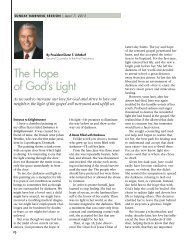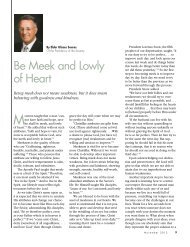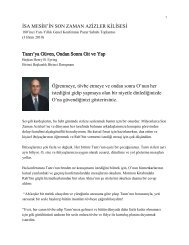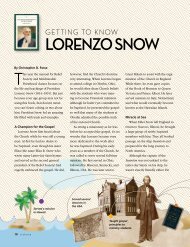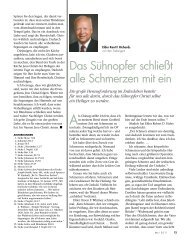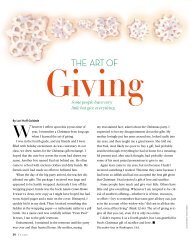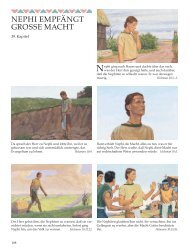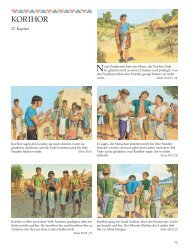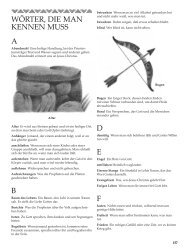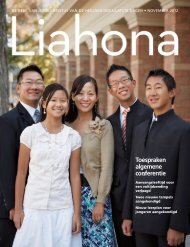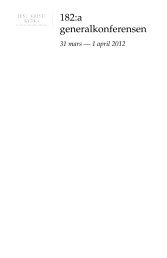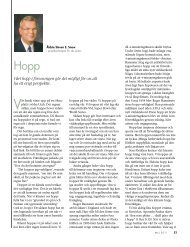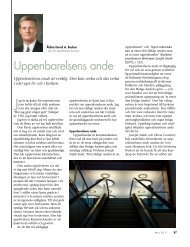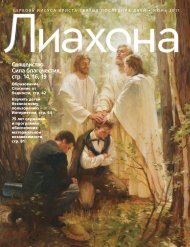February 2012 Ensign - The Church of Jesus Christ of Latter-day ...
February 2012 Ensign - The Church of Jesus Christ of Latter-day ...
February 2012 Ensign - The Church of Jesus Christ of Latter-day ...
Create successful ePaper yourself
Turn your PDF publications into a flip-book with our unique Google optimized e-Paper software.
SERVING IN THE CHURCH<br />
HANDLING CRITICISM<br />
IN OUR CALLINGS<br />
Name withheld<br />
An interesting blessing and<br />
challenge about a lay church<br />
is that we have to be patient<br />
with each other and ourselves as we<br />
learn and grow in our callings. When<br />
a difficult and sensitive situation—<br />
one that involved several ward<br />
members—came up in my calling, I<br />
handled it the best I knew how and<br />
moved on, believing the difficult<br />
experience was behind me.<br />
I was wrong. Not everyone in our<br />
ward agreed about how the incident<br />
should have been handled, and it<br />
became a point <strong>of</strong> great discussion.<br />
Some agreed with what I had done.<br />
Others thought I’d made a significant<br />
blunder. I felt bad, but since I had<br />
done my best, I tried not to worry too<br />
much about it.<br />
When I was released a short time<br />
later, however, it came as a tremendous<br />
blow. I knew that callings in<br />
the <strong>Church</strong> are only temporary, <strong>of</strong><br />
course, but because <strong>of</strong> the timing, I<br />
felt as though my leaders were blaming<br />
or punishing me for what had<br />
happened.<br />
<strong>The</strong> scrutiny seemed more intense<br />
than ever, and I wasn’t sure I wanted<br />
to face anyone in the ward right away.<br />
So the week following my release, I<br />
stayed home from church. I did so<br />
again the next week—and the next.<br />
<strong>The</strong> longer I stayed away, the more<br />
difficult it seemed to return.<br />
After some time, I started thinking<br />
about what had happened. I realized<br />
that even though this was a painful<br />
situation, it wasn’t worth putting<br />
my covenants on the line. Was the<br />
<strong>Church</strong> true or wasn’t it?<br />
Maybe I had handled the situation<br />
in my calling appropriately; maybe I<br />
hadn’t. <strong>The</strong> truth is all <strong>of</strong> us are learning,<br />
and all <strong>of</strong> us make mistakes.<br />
As painful as it was to admit,<br />
maybe who was right or wrong<br />
didn’t really matter in the grand<br />
scheme. What would matter, though,<br />
was whether I kept my covenants.<br />
It would matter—both to my family<br />
and me—if I was attending church,<br />
renewing my covenants in sacrament<br />
meeting, and continuing to serve. And<br />
it would matter how I responded to<br />
priesthood authority.<br />
I returned to church. A short time<br />
later I received another calling. That<br />
calling—and callings since—required<br />
that I serve with some <strong>of</strong> the people<br />
who had criticized my actions. That<br />
has been difficult. But I am glad I<br />
haven’t let their comments stop me<br />
from enjoying the blessings <strong>of</strong> <strong>Church</strong><br />
activity. ◼<br />
GIVING EACH OTHER THE<br />
BENEFIT OF THE DOUBT<br />
“Perhaps the greatest charity<br />
comes when we are kind to each<br />
other, when we don’t judge or<br />
categorize someone else, when<br />
we simply give each other the<br />
benefit <strong>of</strong> the doubt or remain<br />
quiet. Charity is accepting<br />
someone’s differences, weaknesses,<br />
and shortcomings; having<br />
patience with someone who<br />
has let us down; or resisting the<br />
impulse to become <strong>of</strong>fended<br />
when someone doesn’t handle<br />
something the way we might<br />
have hoped. Charity is refusing<br />
to take advantage <strong>of</strong> another’s<br />
weakness and being willing to<br />
forgive someone who has hurt<br />
us. Charity is expecting the best<br />
<strong>of</strong> each other.”<br />
Elder Marvin J. Ashton (1915–94) <strong>of</strong> the<br />
Quorum <strong>of</strong> the Twelve Apostles, “<strong>The</strong><br />
Tongue Can Be a Sharp Sword,” <strong>Ensign</strong>,<br />
May 1992, 19.<br />
<strong>February</strong> <strong>2012</strong> 15



